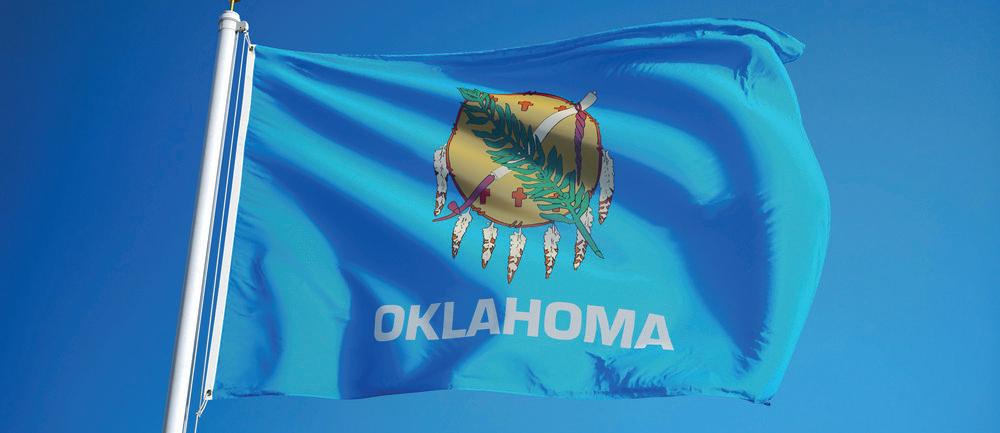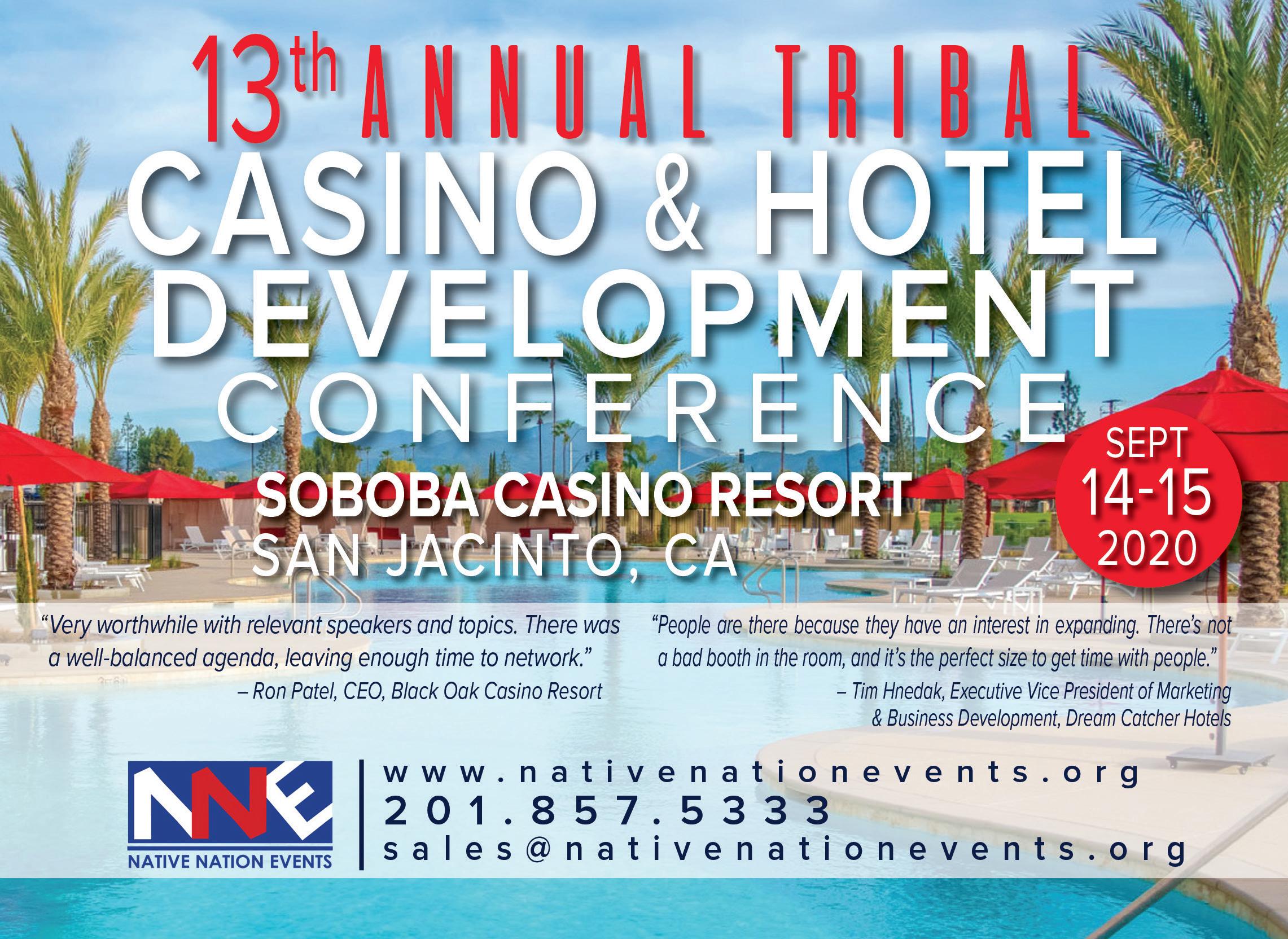
12 minute read
GAMING THE SYSTEM 24
STATE OF PLAY
Sheila Morago, executive director of the Oklahoma Indian Gaming Association (OIGA), sits with Carl Friedmann and calls for flexibility as tribal members confront legal and natural challenges in equal measure.
Given the current situation in Oklahoma, especially with a surge in coronavirus cases in June, what are your immediate priorities at OIGA and how are you able to manage such a constant and unpredictable landscape?
At OIGA, thankfully our priorities don’t waver, and they’re spelled out in our mission statement: The mission of the Oklahoma Indian Gaming Association is to promote the general welfare of the Oklahoma Indian Tribes through the development of sound policies and practices with respect to the conduct of gaming enterprises in Indian Country. As a trade association, the purpose of OIGA is to educate and disseminate information to the tribal, federal and state governments, and the general public on issues relating to tribal government gaming.
Now, the tactics and situations have certainly become more dynamic and focused over the past year, and between the ongoing compact dispute with Oklahoma’s governor and the extremely fluid situation created by COVID-19, I cannot think of a year that has required more flexibility. OIGA is fortunate to have very engaged leadership, who are able to meet via Zoom at a moment’s notice and work together to steady the ship as much as possible during these unprecedented times.
Is there a consensus among the OIGA membership of the best and safest way forward?
Generally speaking, yes. The safest way forward for every Tribal Nation and every gaming facility is to do everything possible to reduce the possibility of infection for staff and guests, to identify and isolate any cases which occur, and to continue to sanitize and execute temporary closures when needed. Each facility uses slightly different combinations of tactics to achieve these goals, based on their size, entertainment offerings and so forth. Our operators and regulators have been working together to share their experiences so we're all working in the same direction. Every Tribal Nation shares the same priority: safety and health.

What do you and OIGA chairman Matthew Morgan see as the best workable relationship with Gov. Stitt’s office, and is there room for mutually beneficial compromises?
As we have said from the beginning, Tribal Nations are willing to come together with Gov. Stitt to work together for the good of Oklahoma. This will happen the moment he recognizes that the compacts auto renewed on Jan. 1, 2020. Unfortunately, his unwillingness to acknowledge that fact has caused us all to embark on an unnecessary journey through the legal system, which is ongoing. OIGA looks forward to continuing to make Oklahoma a better place to live and work for all Oklahomans.
What contingency plans do you have in place for the 202 OIGA show given the erratic progress of containing the spread of COVID-19?
We are in near-daily discussions with OIGA leadership about issues such as this. As we are all experiencing, it’s a very hard time to make plans but we are doing our best to balance optimism and realism. It is, of course, our hope that by late July 2021 we will be in a much safer place than we are now.
What are the fundamental points of contention Was there any consideration to salvage the 2020 between OIGA and Gov. Stitt that have labelled show in a virtual format?
this process as an impasse, and how can OIGA did consider attempting a virtual format, at least for the legal weight of Oklahoma’s legislative the conference portion of our event. Our trade show, as leadership and AG Mike Hunter help you know, is a bit like a family reunion and attempting to enable positive solutions? recreate its energy and showcase the latest and greatest The plain language of the compact offerings from companies who come from all over the states that the compact world to be with us was “shall automatically renew Jan. 1, 2020.” The compacts “BETWEEN THE ONGOING logistically impossible. In the end, our decision did indeed become open for limited negotiation on both COMPACT DISPUTE was to cancel 2020 entirely and focus sides for a period of 180 WITH OKLAHOMA’S on 2021. days before their renewal date, which Gov. Stitt also GOVERNOR AND THE As a result of chose to ignore. During the 180-day time period, either party (State of Oklahoma EXTREMELY FLUID SITUATION CREATED the pandemic, approximately 241 tribes stand to lose or the Tribes) “may request to renegotiate the terms of BY COVID-19, I CANNOT about $22.4bn in 2020, more than half subsections A and E of Part THINK OF A YEAR their projected revenue 11” of the compact. If the other side doesn’t agree, THAT HAS REQUIRED this year, according to the National Indian the existing compact shall automatically renew for 15 MORE FLEXIBILITY.” Gaming Association. Can you break down more years. the validity of this
That is to say that should the State suggest a statistic and speak about how OIGA’s proportion of term to which a Tribe disagree, or vice versa, the that is impacting the industry in Oklahoma and its current compacts remain in place. And that is what tribal citizens? happened, although Gov. Stitt’s actions, which now We don’t have specific numbers for Oklahoma yet, include executing new compacts between himself but impact is definitely being felt. Tribal Nations in and a number of Oklahoma Tribal Nations add Oklahoma are deeply committed to the well-being layers of legal complexity. It’s the position of of their guests, citizens and fellow Oklahomans. All OIGA, Oklahoma Attorney General Mike Hunter of the casinos in Oklahoma closed down before any and Oklahoma’s legislative leadership that Gov. other businesses in the state, and many were closed Stitt doesn’t have the legal ability to enter into for more than 60 days. Revenues from gaming facilities such agreements. fund tribal governments, so the trickle-down effect is
These are the issues now working their way being felt now. It’s especially difficult for some of the through the legal system, and once resolved, smaller tribes.


PUTTING IT ON THE LINE
Tim Poole explores the outdated notion that digital gaming hinders its land-based counterpart, urging a hastening of online adoption within the US market.
In the charming 2013 comedy The Internship – I’m a fan but critics rightly point out it’s ultimately a feature-length Google ad – Vince Vaughn’s character keeps saying “on the line” instead of “online.” The joke pokes fun at the older generation’s understanding of all things digital. Yet in US gaming, a reference of this kind often doesn’t feel out of place. I, for instance, am constantly reminded of when Rhode Island Governor Gina Raimondo discussed the state’s 2019 launch of sports betting without a mobile component. She spoke of mobile being the “future” and the state misjudging that factor, subsequently missing out on its revenue targets. Since when was something that’s been a dominant force for the past two decades considered the future?
While there is already, to its credit, a burgeoning online sports betting market in several US states (and online gaming in New Jersey and Pennsylvania), prime examples such as the above highlight the very different feel of the US market to other countries. This isn’t just from politicians but within the industry itself, too, which is understandably a little protective of its rich history of land-based success. An extreme form of this anti-online prejudice is the Coalition to Stop Internet Gambling, something I have always been fascinated by, which is designed to preserve the revenue of land-based casino operators against a rising tide of online gambling.
As was discussed at an industry panel earlier this summer, retail operators have often seen online as the "enemy."
But how self-defeating is something like the Coalition to Stop Internet Gambling at a time like this? While the coronavirus pandemic has brought many industries to a halt, land-based casinos have been heavily impacted. Online casino, however, is a product that has continued to entertain players unabated during the COVID-19 crisis.
In Europe, affiliates and operators have spoken of a silver lining to an overall decline in gambling revenue through increases in esports, virtuals and poker. But the biggest volumes of all have come from online casino. In New Jersey, meanwhile, that much was proven with the release of April’s financial report by the state's regulator. With the main headline being a record fall in overall revenue in Atlantic City, online gaming figures more than doubled to a record $80m. Online poker, too, tripled to a record $5.2m, but the star of the show by far was online casino, which saw huge rises ranging from a 62% year-on-year increase for Tropicana to a 267% yearly rise for Ocean Casino.
This continued in May, when internet gaming win rose 124% year-on-year to $85.9m. Year-to-date internet gaming win for 2020 was up 88.3% to $337.8m through May. Key states like New York, meanwhile, remain without a mobile component, deprived of that taxable revenue. Even during a pandemic, these numbers speak for themselves. It’s a clear message to all retail operators to put aside perceptions against online and, rather, utilize the digital options now available to them in abundance.
For states outside the very few that have already regulated online gaming, it should also serve as yet another wake-up call that there’s a strong source of growing revenue, ready to be offered at a time when state tax levels are more important than ever. Admittedly, there are considerations that cannot be ignored. Introducing a new way for customers to lose money during a time of crisis may not be publicly welcomed. Governments undoubtedly have plenty of other priorities to address at this time, too, while responsible gambling concerns will naturally be higher due to what is the riskier nature of online casino.
But these facts still remain: 1. Sports betting recently launched in Colorado, showing states can move forward with new verticals even during a pandemic. In May, its first month of legal sports wagering, Colorado generated almost $1m in sports betting revenue from handle of $25.6mwhile casinos were closed. That’s a

completely new source of revenue, which would only an approximate market capitalisation of $3.3bn earlier increase with online casino added to it, and would this year. DraftKings primarily offers daily fantasy sports be simply unattainable during land-based closures. and sports betting but hasn’t been slow to move into Convergent operators have also spoken of a lack of casino, virtuals and live casino. cannibalization, with data showing mobile betting In truth, a flurry of partnerships has been signed would only add to revenue, rather than stop those between online operators and US casinos, so at least who want to go to a physical casino. some sections of the industry are moving in the right 2. Online gaming is a source of revenue on the up direction. Betsson and Gaming Innovation Group recently for both gaming companies and state governments, moved into Colorado, Kambi signed with Four Winds while land-based revenue had been on hiatus and is Casinos, DraftKings partnered with Bay Mills Resort & only just resuming. In New Jersey, for instance, while Casino, Playtech entered the New Jersey market, and online flourishes, there is new uncertainty for retail there are plenty more. But there’s still a cloud over properties with the whether many land-based postponed reopening of properties, regulators and indoor dining due to a spike in coronavirus cases. 3. Online gaming and “EVEN DURING A PANDEMIC, THESE state governments will remain entrenched in their anti-online stances sports betting with illegal websites continues to NUMBERS SPEAK FOR once the impact of the pandemic is lessened. thrive, meaning the verticals take place anyway, without THEMSELVES. IT’S Speaking in the July/August edition of regulated operators and A CLEAR MESSAGE Gambling Insider, Evolution state governments seeing the benefits. TO ALL RETAIL Gaming CEO Martin Carlesund and Lightning 4. Responsible gambling tools are more readily OPERATORS TO PUT Box Games CEO Peter Causley discussed a rapid available online due to ASIDE PERCEPTIONS oncoming digitalization advanced software and technology, meaning AML AGAINST ONLINE AND, that has only been accelerated by the and age verification can be far more effective in a digital RATHER, UTILIZE THE pandemic. Carlesund believes 50 to 70% of the environment. Pretending there aren't already huge, safely regulated online casino DIGITAL OPTIONS NOW AVAILABLE TO THEM casino sector will end up online, while Causley thinks the next 12 months markets around the world is simply living in ignorance, so IN ABUNDANCE.” could see 10 years’ worth of convergence between the increased risk of online the land-based and online casino can be counteracted sectors. The need for this here if managed properly. is pressing, and even as we come out of the pandemic,
Ultimately, it beggars belief there’s still industry opposition casinos will not be at pre-COVID levels of revenue or to online gaming in the US. There’s nothing wrong with EBITDA. Crucially, convergence means land-based and remaining retail-strong, of course, but the necessity for an online working side by side, not as opponents. online arm of some kind is plain to see. While new online But this is on a global scale. As we discussed in our gaming markets might be ambitious at a time like this, at debate earlier in this issue, it remains to be seen exactly the very least those in existing markets should put their how much the US market itself embraces digitalization. digital prejudices aside. Will companies, politicians and regulators welcome
Currently, there are only two purely publicly traded modernity or stick rigidly to the principles of the past? online casino operators in the US. Golden Nugget Online Sports betting companies have embraced online a little Gaming (GNOG) recently became the second, going public more but regulators, lawmakers and casino operators at a valuation of approximately $745m. That is no small are much less eager when it comes to online gaming. sum, nor is the valuation of DraftKings, a predominantly Right now, the Coalition to Stop Internet Gambling may online firm that has soared in value since going public at as well be the Coalition to Stop Gambling Altogether.








